Let’s Talk About the Future of Healthcare (Spoiler: It Talks Back)
Here’s the thing—healthcare is going through a major transformation. And one of the biggest drivers behind that shift? Voice AI.
From the clinic to the call center, this technology is changing how providers and patients communicate—and fast.
In fact, the voice AI market in healthcare is growing at a jaw-dropping pace, with projections showing an annual growth rate of over 37% through 2030. That’s not just hype—that’s a full-on acceleration.
And when you think about it, it makes total sense. Imagine if doctors could speak to their systems like you talk to Alexa or Siri—and those systems could actually understand, respond, and take action.
That’s the power of voice AI in healthcare.
It’s like giving every provider a super-smart assistant that’s always on, never gets tired, and remembers everything.
So… What Is Voice AI in Healthcare, Really?
Basically, it’s a technology that lets healthcare systems understand human speech. Not just any speech—think medical terms, doctor-patient convos, even surgery commands. It’s built on stuff like speech recognition and machine learning (the kind of smarts that let your phone figure out what you’re saying even when your mouth is full).
It’s like giving your doctor a super-smart assistant that never sleeps and always remembers everything. And it’s not just a cool idea; the market’s catching on fast, growing at a 19.9% CAGR and projected to hit $21.67 billion by 2032.
How Is It Actually Being Used?
1. Helping Doctors Ditch the Paperwork
Ever wonder how much time doctors spend typing notes? A lot. With voice AI in healthcare, they can just talk during appointments, and the system writes everything down for them. That means less screen-staring and more eye contact with patients. Win-win.
And it’s happening faster than we think. In 2024, investment in AI-powered medical note-taking apps surged to $800 million, doubling from $390 million in 2023, as tech giants and startups alike sought to capitalize on the burgeoning $26 billion AI healthcare market.
2. Talking to Patients (Yep, Really)
Need to book an appointment? Get a med reminder? Ask about a weird rash?
There are now voice assistants that can help you with all of that, using natural, friendly conversations. Kinda like a medical Siri, but actually helpful.
It is not just us who are claiming it, data shows that by 2026, 80% of healthcare conversations will involve some kind of voice AI technology.
3. Hands-Free Help in the Hospital
In places like operating rooms, touching stuff isn’t always an option. Voice AI in healthcare lets doctors and nurses use voice commands to pull up info without needing to stop what they’re doing. Super handy!
4. Making Life Easier for Seniors
For older adults or folks who need care at home, voice AI can be a total game-changer. It can remind them to take meds, check in on how they’re feeling, or even call for help if something’s wrong. It’s like having a friendly, always-on helper around.

You’ve Heard of Voice Assistants… But Voice AI Phone Agents? That’s the Real Game-Changer
So far, we’ve talked about voice AI helping doctors ditch paperwork, assisting patients at home, and even pulling up data hands-free in the OR. But there’s a whole other side to this story that not many people know about yet—voice AI phone agents.
Sure, everyone’s heard of Alexa, Siri, or even basic phone trees that say “Press 1 for appointments.” But this is different. We’re talking about actual AI-powered phone agents that understand real human conversations, answer questions, and help patients just like a live person would—only faster, cheaper, and around the clock.
And in healthcare, where phone lines are jammed and admin teams are stretched thin, this tech is a total game-changer.
Top 9 Use Cases of Voice AI Phone Agents in Healthcare (That Are Already Making an Impact)
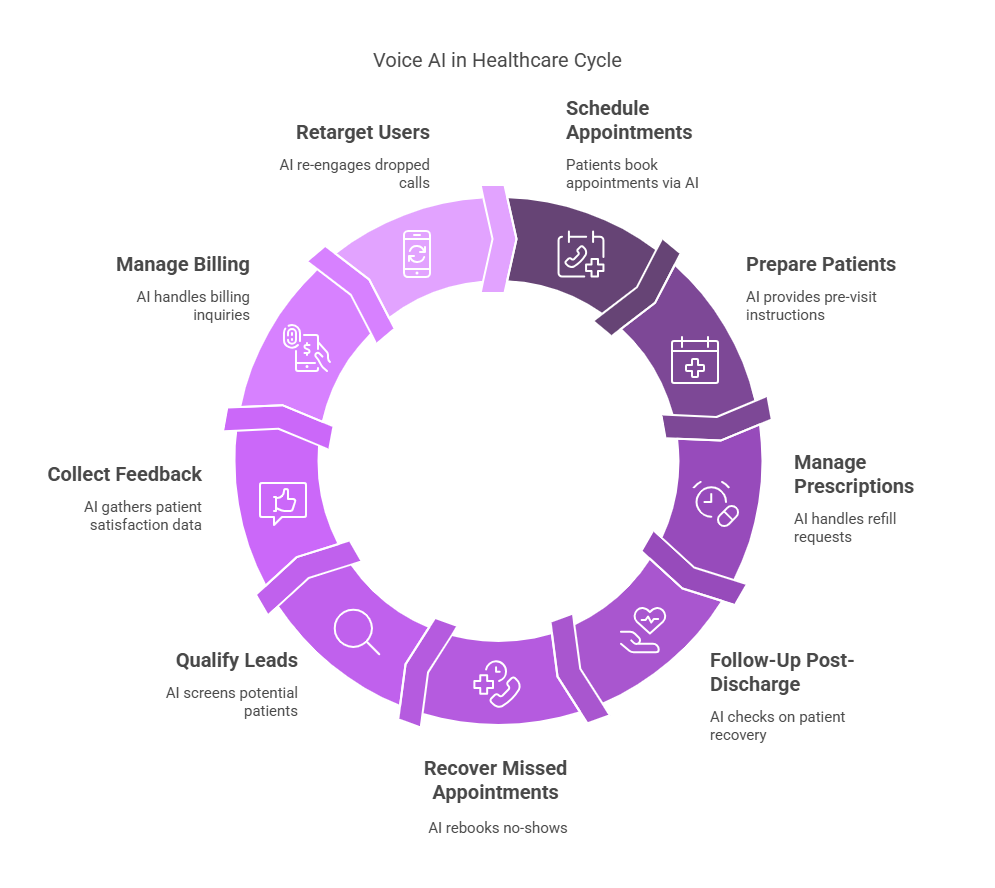
1. Real-Time Appointment Scheduling & Management
This is the big one. Patients call in, say something like, “I need to book a follow-up with Dr. Patel next week,” and the voice AI takes it from there. It checks availability, confirms insurance if needed, and locks in the appointment—all in one smooth call. It even sends reminders and lets people reschedule without any staff getting involved.
Why it matters: It eliminates wait times, reduces scheduling errors, and keeps front desk teams from getting overwhelmed. Plus, it works 24/7. And it is working as we speak, around 72% of patients are comfortable using voice AI assistants to schedule appointments.
2. Pre-Visit Preparation & Digital Check-In Calls
Before a patient even shows up, a voice agent can call them to walk through everything they need to know—fasting instructions, insurance verification, symptom screening, or COVID protocols. It can collect consent forms, ask pre-op questions, and flag anything urgent for a nurse or provider.
Why it matters: This improves patient readiness, reduces last-minute cancellations, and saves tons of time during check-in.
3. Prescription & Medication Refill Handling
Instead of calling the clinic and waiting on hold just to request a refill, patients can talk to a voice AI agent who verifies their last prescription, collects details, and even checks eligibility before routing it to the care team or pharmacy.
Why it matters: It reduces bottlenecks at the front desk and ensures patients get their meds faster—especially for recurring prescriptions.
4. Automated Post-Discharge Follow-Ups
After a hospital stay or procedure, patients usually need a follow-up—but many never get one unless they call in. Voice AI agents can call them automatically, ask a bout their recovery, remind them about medication, and schedule check-ins or escalate to a nurse if something sounds off.
Why it matters: This improves outcomes, reduces readmissions, and ensures patients don’t fall through the cracks after care.
5. No-Show & Missed Appointment Recovery
Missed appointments cost clinics a lot of money. Voice AI can follow up with no-shows automatically—asking why they missed, offering a new time, and rebooking them in under two minutes. It’s proactive, polite, and highly effective.
Why it matters: Clinics recover revenue, patients feel cared for, and schedules stay full without extra work from staff.
Bonus Use Cases You’ll Be Seeing Soon
- Billing & Payment Support: “You have a $75 balance—would you like to pay over the phone now?” Yep, AI can do that too.
- Lab Results Notifications: Simple results like “everything’s normal” can be delivered via phone AI, saving nurses hours every week.
- Chronic Condition Check-Ins: For patients with diabetes, hypertension, etc., regular phone calls can help with compliance and symptom tracking.
- Insurance Eligibility Checks: Before appointments, AI agents can confirm if the patient is still covered and send alerts if there’s an issue.
6. Lead Qualification
Before a patient ever steps into the clinic, voice AI phone agents can engage prospects, qualify their needs, and route them accordingly. These agents can ask targeted questions, confirm treatment interests, and determine eligibility—all automatically.
Why it matters: Clinics and providers get pre-qualified leads that are more likely to convert, while reducing the manual work of early-stage screening. It’s like having a digital front-line sales rep working around the clock.
7. Survey & Feedback Collection
Patient experience matters, and voice AI agents can help improve it by collecting feedback after visits, procedures, or calls. These surveys are conversational and feel less robotic, leading to higher response rates and better data.
Why it matters: Real-time insights into patient satisfaction help providers improve care quality, service delivery, and overall experience—without needing to chase down surveys manually.
8. Debt Collection & Billing Follow-Ups
Voice AI agents can handle delicate billing conversations with empathy and efficiency. Whether it’s reminding patients of an outstanding balance, explaining a recent charge, or offering payment options, the AI ensures consistent, polite communication.
Why it matters: Automating billing follow-ups helps improve cash flow and collections without overloading your front desk or putting pressure on staff to handle difficult conversations.
9. Retargeting Dropped Users to Improve Conversion
Sometimes patients abandon calls, online forms, or appointment bookings halfway through. Voice AI can identify these drop-offs and proactively re-engage them through smart follow-ups—offering to complete the process, answer questions, or schedule time with a provider.
Why it matters: This boosts conversion rates by recovering lost opportunities, reduces churn, and makes sure no potential patient falls through the cracks—without lifting a finger on your end.
Leading Voice AI Phone agents Platforms Making This Happen
Retell AI
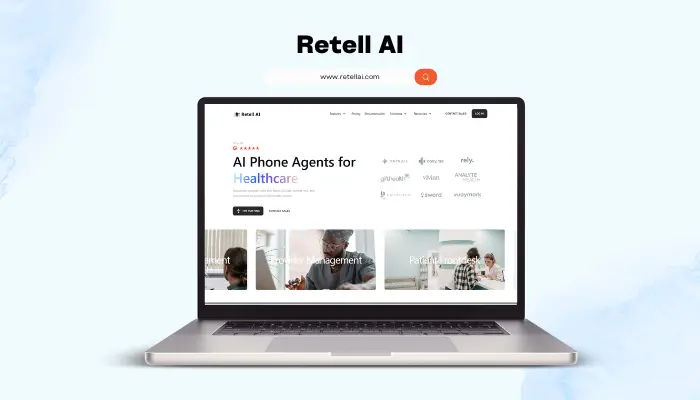
Recently securing its seed round with Y-Combinator, Retell AI is making waves with highly conversational phone agents that feel natural, responsive, and almost human. They’re tailored for healthcare workflows, helping clinics and practices handle calls related to appointment booking, intake, follow-ups, and more—without needing to retrain staff or overhaul systems.
What sets them apart is the fluidity of their conversations; patients don’t feel like they’re “talking to a bot,” and that’s a big deal in care environments where trust and tone matter.
They’re also focused on quick implementation and seamless integration with calendars, CRMs, and even EHRs—so teams can get up and running fast without a technical headache.
Hyro
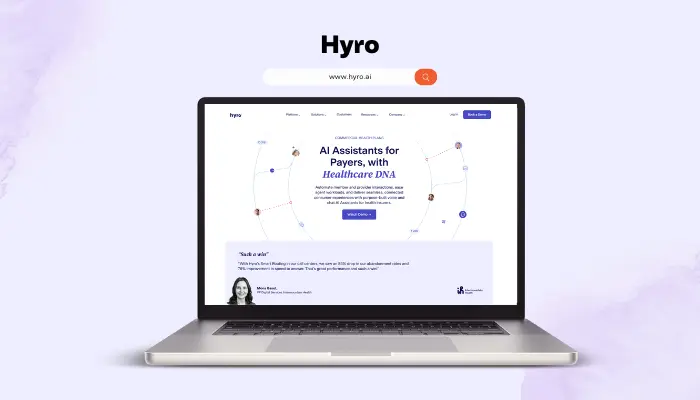
Hyro is building what they call an “adaptive communications platform,” and it’s doing a fantastic job bridging voice AI across phone, web, and mobile touchpoints. Their voice agents plug into existing healthcare systems to automate common workflows like scheduling, triage, FAQs, and more.
What’s unique about Hyro is their “plug-and-play” approach. They make it easy for large organizations—like hospitals, payers, and multi-location health systems—to roll out AI assistants that learn and scale with them. They’re a great fit for teams that want consistency across communication channels without needing custom builds from scratch.
Kore.ai
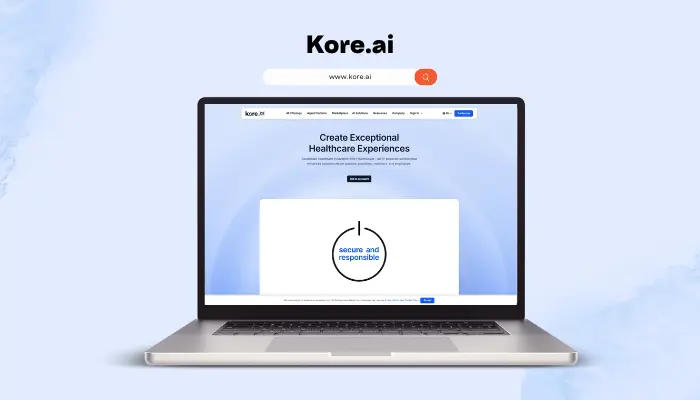
Kore.ai delivers enterprise-grade voice and chat automation with powerful natural language processing and deep backend integrations. In healthcare, their voice agents are being used by providers, insurance companies, and pharmacies to handle everything from appointment scheduling to insurance verification to claims support.
Kore.ai shines when it comes to building complex voice workflows that can span multiple steps and systems. For example, a patient could call in about a denied claim, and the AI could gather info, check claim status, and explain next steps—all without human intervention.
Nuance (part of Microsoft)
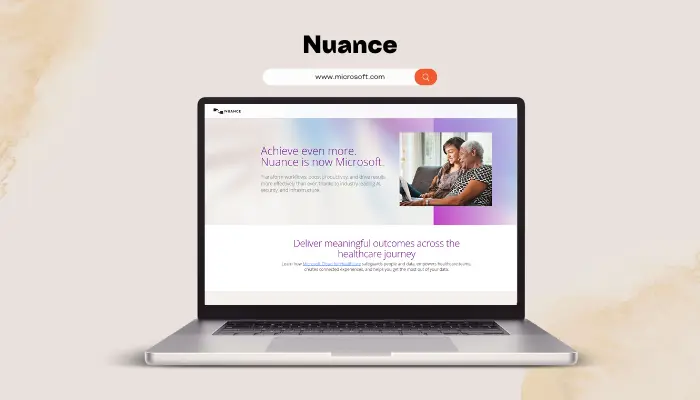
Nuance has long been a leader in voice tech—especially in the clinical documentation space—but they’re now expanding into patient-facing automation as well. Their voice AI capabilities are being used to power virtual agents for call centers, helping health systems handle high call volumes more efficiently while still delivering a human-like experience.
Nuance’s DAX Copilot tool is now documenting over 1.3 million physician-patient encounters each month across more than 500 U.S. healthcare groups, showcasing the scalability and effectiveness of voice AI solutions in clinical settings.
Backed by Microsoft’s cloud and AI stack, Nuance’s solutions are robust, secure, and easily scalable for enterprise environments. They’re a great option for healthcare systems that already use Microsoft tools or want something deeply integrated with existing infrastructure.
Amelia
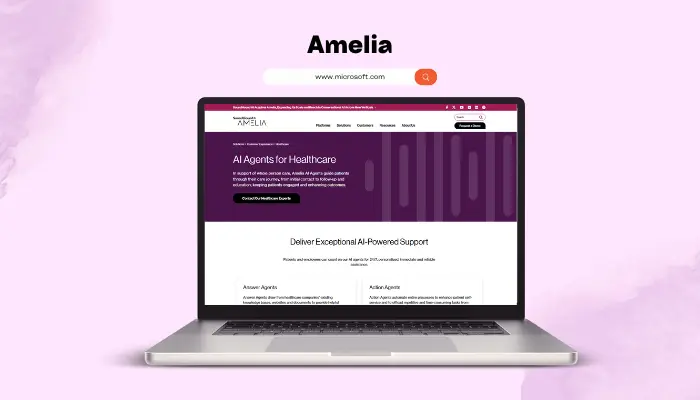
Amelia stands out for building emotionally intelligent, context-aware AI agents that can handle complex, nuanced conversations, making them ideal for use cases like benefits explanations, care plan guidance, or even mental health triage.
What’s cool about Amelia is her ability to adapt mid-conversation. If a patient changes the topic, gets confused, or needs escalation, the AI can respond naturally without rigid scripts. That level of flexibility makes Amelia well-suited for workflows that go beyond just “yes/no” logic and venture into more dynamic back-and-forth.
Why People Are Loving Voice AI Agents in Healthcare
The excitement around voice AI isn’t just hype—it’s because it’s actually solving real problems in healthcare, for both providers and patients. Here’s why people are totally on board with it:
It saves time. A lot of time.
Whether it’s doctors speaking notes instead of typing, or voice agents handling dozens of daily calls without missing a beat, AI is shaving hours off the workday. That means faster care and less burnout.
It makes things feel more personal—not less.
Ironically, having voice AI handle the boring admin stuff lets human staff spend more time actually connecting with patients. No more rushed conversations because someone’s stuck on the phone for 20 minutes rebooking an appointment.
It’s always on.
Patients don’t have to wait for office hours. They can call at 10 p.m., talk to a voice agent, and get help—whether that’s scheduling a visit, refilling a prescription, or just getting peace of mind.
It’s surprisingly easy to use.
No apps to download, no forms to fill out—just pick up the phone and speak. It’s accessible for people of all ages, tech comfort levels, and even languages (depending on the platform).
It helps prevent things from falling through the cracks.
Follow-ups, missed appointments, pre-op instructions, post-op check-ins—voice AI handles them all reliably and consistently. That kind of coverage just isn’t possible with humans alone, especially when teams are short-staffed.
P.S.: If you are working at a hospital front desk, you should start looking for another job.
Of Course, It’s Not All Perfect (Yet)
Even with all the perks, there are still a few things to work out:
Privacy and compliance matter. A lot.
Healthcare data is sensitive, and systems handling patient conversations need to be fully HIPAA-compliant, locked down, and secure. The good news? Most serious platforms are on top of this.
It’s still learning.
Voice AI isn’t flawless—yet. It can occasionally misunderstand medical terms, background noise, or strong accents. But it’s improving fast, especially with more real-world usage.
Bias in AI is a real concern.
If voice AI doesn’t understand certain accents or dialects as well as others, that’s a problem. Developers are working on this, but it’s something the industry still needs to solve more fully.
Tech readiness isn’t universal.
Some healthcare systems are still using legacy software that doesn’t play well with modern AI tools. Integration takes planning, but the payoff is worth it.
CTA:
This is exactly where we come in.
At Enacton, we specialize in helping healthcare organizations modernize their infrastructure so they’re ready to take full advantage of technologies like voice AI phone agents. Whether it’s upgrading outdated systems, building custom middleware, or creating seamless integrations with EHRs, CRMs, and third-party platforms—we’ve got it covered.
Our team works closely with yours to make sure every piece fits—from data security and compliance to workflow automation and patient experience. So when you’re ready to adopt voice AI, your systems won’t just be ready… they’ll be optimized to thrive.
Let’s make your tech stack future-ready.
Real-World Proof: This Isn’t Science Fiction
These tools aren’t sitting in a lab somewhere—they’re already helping real doctors, clinics, and patients every single day.
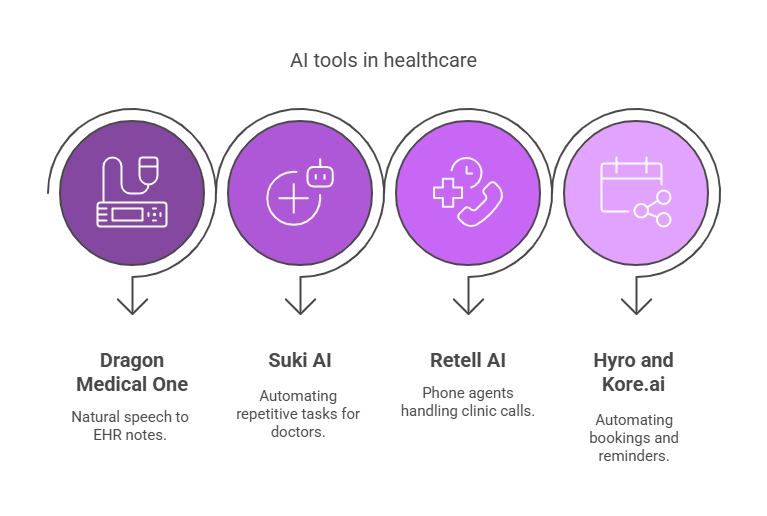
- Dragon Medical One is letting providers speak naturally during visits and have their notes magically appear in the EHR.
- Suki AI is acting like a digital medical assistant, remembering how each doctor speaks and automating repetitive tasks.
- Retell AI is giving clinics phone agents that handle calls like a front desk superstar—minus the stress.
- Hyro, Kore.ai, and others are powering systems that can book, remind, verify, and follow up without missing a beat.
Clinics using these tools are saving hours per week per provider, recovering thousands in lost revenue from no-shows, and improving patient satisfaction along the way.
Where’s This All Going?
Honestly? We’re just getting started. The next few years are going to be wild—in the best way.
- You might talk to a smart voice agent before you ever speak to a receptionist.
- Your post-op recovery might be managed by daily check-ins with a voice bot.
- Voice AI could become your go-to for managing chronic conditions—reminding you to take meds, tracking your symptoms, and even sending updates to your doctor.
- And soon, it’ll speak your language, know your preferences, and be part of a fully connected care experience.
Wrapping It Up
So yeah—this isn’t just about tech for tech’s sake. Voice AI in healthcare is actually making things better: for overworked doctors, busy clinics, and patients who just want help without the hassle.
It’s not replacing humans—it’s helping them focus on what matters most: caring for people.
And if your doctor’s office starts answering the phone with a really friendly, super-efficient voice that seems too good to be true… don’t be surprised if it’s not a person at all.
That’s just the future of healthcare. And yep—it talks back.
At Enacton, we help healthcare providers bring AI to life—seamlessly embedding it into your operations, workflows, and patient journeys. Whether you’re starting from scratch or looking to scale your existing tools, we’re here to make sure the transition is smooth, secure, and future-ready.
Let’s connect and explore how we can power your voice AI journey.
